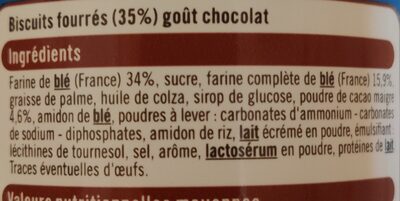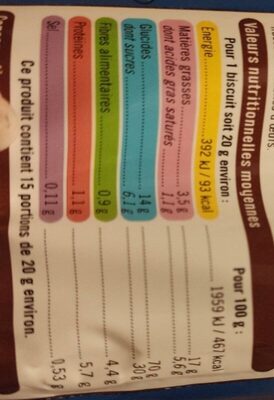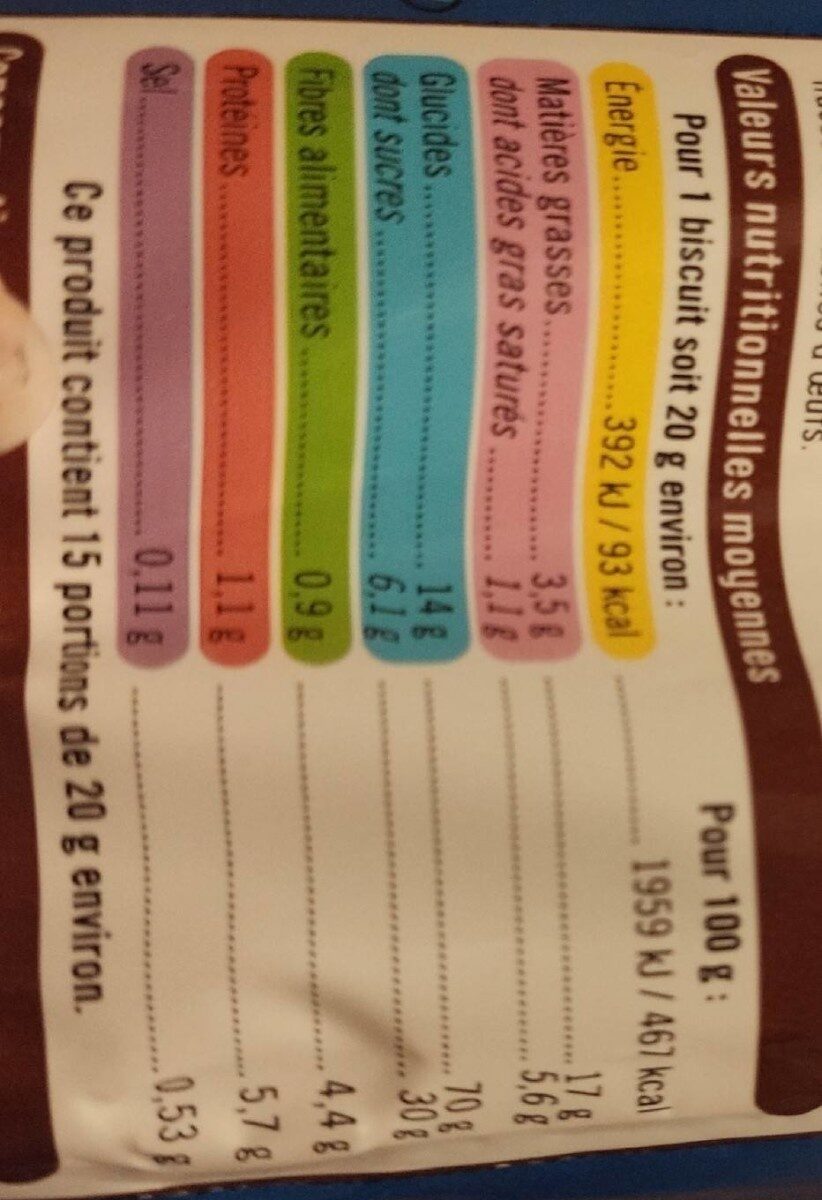Help us make food transparency the norm!
As a non-profit organization, we depend on your donations to continue informing consumers around the world about what they eat.
The food revolution starts with you!
Biscuits fourrés goût chocolat - U - 300 g
Biscuits fourrés goût chocolat - U - 300 g
Barcode: 3256225041350 (EAN / EAN-13)
Common name: Biscuits fourrés parfum chocolat
Quantity: 300 g
Packaging: fr:Feuille en carton, fr:film en plastique
Brands: U
Categories: Snacks, Sweet snacks, Biscuits and cakes, Biscuits, Chocolate biscuits, Filled biscuits
Labels, certifications, awards: Sustainable, Sustainable Palm Oil, fr:Farine de blé français, fr:Entreprise de France
Origin of ingredients: fr:Blé de France
Stores: U Express, Magasins U
Countries where sold: France
Matching with your preferences
Health
Ingredients
-
20 ingredients
: Farine de blé (France) 34%, sucre, farine complète de blé (France) 15.9% graisse de palme, huile de colza, sirop de glucose, poudre de cacao maigre 4,6%, amidon de blé, poudres à lever (carbonates d'ammonium, carbonates de sodium, diphosphates), amidon de riz, _lait_écrémé en poudre, émulsifiant : lécithines de tournesol, sel, arôme, lactosérum en poudre, protéines de lait.Allergens: Gluten, MilkTraces: Eggs
Food processing
-
Ultra processed foods
Elements that indicate the product is in the 4 - Ultra processed food and drink products group:
- Additive: E322 - Lecithins
- Additive: E450 - Diphosphates
- Ingredient: Emulsifier
- Ingredient: Flavouring
- Ingredient: Glucose
- Ingredient: Glucose syrup
- Ingredient: Milk proteins
- Ingredient: Whey
Food products are classified into 4 groups according to their degree of processing:
- Unprocessed or minimally processed foods
- Processed culinary ingredients
- Processed foods
- Ultra processed foods
The determination of the group is based on the category of the product and on the ingredients it contains.
Additives
-
E322 - Lecithins
Lecithins are natural compounds commonly used in the food industry as emulsifiers and stabilizers.
Extracted from sources like soybeans and eggs, lecithins consist of phospholipids that enhance the mixing of oil and water, ensuring smooth textures in various products like chocolates, dressings, and baked goods.
They do not present any known health risks.
-
E322i - Lecithin
Lecithins are natural compounds commonly used in the food industry as emulsifiers and stabilizers.
Extracted from sources like soybeans and eggs, lecithins consist of phospholipids that enhance the mixing of oil and water, ensuring smooth textures in various products like chocolates, dressings, and baked goods.
They do not present any known health risks.
-
E450 - Diphosphates
Diphosphates (E450) are food additives often utilized to modify the texture of products, acting as leavening agents in baking and preventing the coagulation of canned food.
These salts can stabilize whipped cream and are also found in powdered products to maintain their flow properties. They are commonly present in baked goods, processed meats, and soft drinks.
Derived from phosphoric acid, they're part of our daily phosphate intake, which often surpasses recommended levels due to the prevalence of phosphates in processed foods and drinks.
Excessive phosphate consumption is linked to health issues, such as impaired kidney function and weakened bone health. Though diphosphates are generally regarded as safe when consumed within established acceptable daily intakes, it's imperative to monitor overall phosphate consumption to maintain optimal health.
-
E500 - Sodium carbonates
Sodium carbonates (E500) are compounds commonly used in food preparation as leavening agents, helping baked goods rise by releasing carbon dioxide when they interact with acids.
Often found in baking soda, they regulate the pH of food, preventing it from becoming too acidic or too alkaline. In the culinary world, sodium carbonates can also enhance the texture and structure of foods, such as noodles, by modifying the gluten network.
Generally recognized as safe, sodium carbonates are non-toxic when consumed in typical amounts found in food.
-
E503 - Ammonium carbonates
Ammonium carbonate: Ammonium carbonate is a salt with the chemical formula -NH4-2CO3. Since it readily degrades to gaseous ammonia and carbon dioxide upon heating, it is used as a leavening agent and also as smelling salt. It is also known as baker's ammonia and was a predecessor to the more modern leavening agents baking soda and baking powder. It is a component of what was formerly known as sal volatile and salt of hartshorn.Source: Wikipedia
Ingredients analysis
-
Palm oil
Ingredients that contain palm oil: Palm fat
-
Non-vegan
Non-vegan ingredients: Skimmed milk powder, Whey powder, Milk proteins
-
Maybe vegetarian
Ingredients that may not be vegetarian: Flavouring, Whey powder
-
Details of the analysis of the ingredients
: Farine de _blé_ 34%, sucre, farine complète de _blé_, graisse de palme 15.9%, huile de colza, sirop de glucose, poudre de cacao maigre 4.6%, amidon de _blé_, poudres à lever (carbonates d'ammonium, carbonates de sodium, diphosphates), amidon de riz, _lait_écrémé en poudre, émulsifiant (lécithines de tournesol), sel, arôme, _lactosérum_ en poudre, protéines de _lait_- Farine de _blé_ -> en:wheat-flour - vegan: yes - vegetarian: yes - ciqual_proxy_food_code: 9410 - percent_min: 34 - percent: 34 - percent_max: 34
- sucre -> en:sugar - vegan: yes - vegetarian: yes - ciqual_proxy_food_code: 31016 - percent_min: 15.9 - percent_max: 20.4
- farine complète de _blé_ -> en:whole-wheat-flour - vegan: yes - vegetarian: yes - ciqual_proxy_food_code: 9410 - percent_min: 15.9 - percent_max: 20.4
- graisse de palme -> en:palm-fat - vegan: yes - vegetarian: yes - from_palm_oil: yes - ciqual_proxy_food_code: 16129 - percent_min: 15.9 - percent: 15.9 - percent_max: 15.9
- huile de colza -> en:colza-oil - vegan: yes - vegetarian: yes - from_palm_oil: no - ciqual_food_code: 17130 - percent_min: 4.6 - percent_max: 9.1
- sirop de glucose -> en:glucose-syrup - vegan: yes - vegetarian: yes - ciqual_proxy_food_code: 31016 - percent_min: 4.6 - percent_max: 7.4
- poudre de cacao maigre -> en:fat-reduced-cocoa-powder - vegan: yes - vegetarian: yes - ciqual_food_code: 18100 - percent_min: 4.6 - percent: 4.6 - percent_max: 4.6
- amidon de _blé_ -> en:wheat-starch - vegan: yes - vegetarian: yes - ciqual_proxy_food_code: 9510 - percent_min: 0 - percent_max: 3.4
- poudres à lever -> en:raising-agent - percent_min: 0 - percent_max: 2.91428571428572
- carbonates d'ammonium -> en:e503 - vegan: yes - vegetarian: yes - percent_min: 0 - percent_max: 2.91428571428572
- carbonates de sodium -> en:e500 - vegan: yes - vegetarian: yes - percent_min: 0 - percent_max: 1.45714285714286
- diphosphates -> en:e450 - vegan: yes - vegetarian: yes - percent_min: 0 - percent_max: 0.971428571428572
- amidon de riz -> en:rice-starch - vegan: yes - vegetarian: yes - ciqual_proxy_food_code: 9510 - percent_min: 0 - percent_max: 2.55
- _lait_écrémé en poudre -> en:skimmed-milk-powder - vegan: no - vegetarian: yes - ciqual_food_code: 19054 - percent_min: 0 - percent_max: 2.26666666666667
- émulsifiant -> en:emulsifier - percent_min: 0 - percent_max: 2.04
- lécithines de tournesol -> en:sunflower-lecithin - vegan: yes - vegetarian: yes - percent_min: 0 - percent_max: 2.04
- sel -> en:salt - vegan: yes - vegetarian: yes - ciqual_food_code: 11058 - percent_min: 0 - percent_max: 0.53
- arôme -> en:flavouring - vegan: maybe - vegetarian: maybe - percent_min: 0 - percent_max: 0.53
- _lactosérum_ en poudre -> en:whey-powder - vegan: no - vegetarian: maybe - percent_min: 0 - percent_max: 0.53
- protéines de _lait_ -> en:milk-proteins - vegan: no - vegetarian: yes - percent_min: 0 - percent_max: 0.53
en:wheat-flour -> en:wheat-flour
Nutrition
-
Poor nutritional quality
⚠ ️Warning: the amount of fruits, vegetables and nuts is not specified on the label, it was estimated from the list of ingredients: 6This product is not considered a beverage for the calculation of the Nutri-Score.
Positive points: 4
- Proteins: 3 / 5 (value: 5.7, rounded value: 5.7)
- Fiber: 4 / 5 (value: 4.4, rounded value: 4.4)
- Fruits, vegetables, nuts, and colza/walnut/olive oils: 0 / 5 (value: 6.85, rounded value: 6.8)
Negative points: 18
- Energy: 5 / 10 (value: 1959, rounded value: 1959)
- Sugars: 6 / 10 (value: 30, rounded value: 30)
- Saturated fat: 5 / 10 (value: 5.6, rounded value: 5.6)
- Sodium: 2 / 10 (value: 212, rounded value: 212)
The points for proteins are not counted because the negative points are greater or equal to 11.
Nutritional score: (18 - 4)
Nutri-Score:
-
Nutrient levels
-
Fat in moderate quantity (17%)
What you need to know- A high consumption of fat, especially saturated fats, can raise cholesterol, which increases the risk of heart diseases.
Recommendation: Limit the consumption of fat and saturated fat- Choose products with lower fat and saturated fat content.
-
Saturated fat in high quantity (5.6%)
What you need to know- A high consumption of fat, especially saturated fats, can raise cholesterol, which increases the risk of heart diseases.
Recommendation: Limit the consumption of fat and saturated fat- Choose products with lower fat and saturated fat content.
-
Sugars in high quantity (30%)
What you need to know- A high consumption of sugar can cause weight gain and tooth decay. It also augments the risk of type 2 diabetes and cardio-vascular diseases.
Recommendation: Limit the consumption of sugar and sugary drinks- Sugary drinks (such as sodas, fruit beverages, and fruit juices and nectars) should be limited as much as possible (no more than 1 glass a day).
- Choose products with lower sugar content and reduce the consumption of products with added sugars.
-
Salt in moderate quantity (0.53%)
What you need to know- A high consumption of salt (or sodium) can cause raised blood pressure, which can increase the risk of heart disease and stroke.
- Many people who have high blood pressure do not know it, as there are often no symptoms.
- Most people consume too much salt (on average 9 to 12 grams per day), around twice the recommended maximum level of intake.
Recommendation: Limit the consumption of salt and salted food- Reduce the quantity of salt used when cooking, and don't salt again at the table.
- Limit the consumption of salty snacks and choose products with lower salt content.
-
-
Nutrition facts
Nutrition facts As sold
for 100 g / 100 mlAs sold
per serving (20g)Compared to: Filled biscuits Energy 1,959 kj
(467 kcal)392 kj
(93 kcal)-0% Fat 17 g 3.4 g -12% Saturated fat 5.6 g 1.12 g -33% Carbohydrates 70 g 14 g +5% Sugars 30 g 6 g -9% Fiber 4.4 g 0.88 g +52% Proteins 5.7 g 1.14 g +1% Salt 0.53 g 0.106 g -2% Fruits‚ vegetables‚ nuts and rapeseed‚ walnut and olive oils (estimate from ingredients list analysis) 6.85 % 6.85 %
Environment
-
Eco-Score C - Moderate environmental impact
⚠ ️Select a country in order to include the full impact of transportation.The Eco-Score is an experimental score that summarizes the environmental impacts of food products.→ The Eco-Score was initially developped for France and it is being extended to other European countries. The Eco-Score formula is subject to change as it is regularly improved to make it more precise and better suited to each country.Life cycle analysis
-
Average impact of products of the same category: C (Score: 56/100)
Category: Biscuit (cookie), with chocolate, prepacked
Category: Biscuit (cookie), with chocolate, prepacked
- PEF environmental score: 0.47 (the lower the score, the lower the impact)
- including impact on climate change: 5.92 kg CO2 eq/kg of product
Stage Impact Agriculture
63.6 %Processing
29.8 %Packaging
2.3 %Transportation
3.2 %Distribution
1.0 %Consumption
0.0 %
Bonuses and maluses
-
Origins of ingredients with a high impact
Malus: 0
Environmental policy: 0
Transportation: 0
Origin of the product and/or its ingredients % of ingredients Impact France 52 %Medium Unknown 48 %High
-
Ingredients that threatens species
Malus: -10
Contains palm oil
Tropical forests in Asia, Africa and Latin America are destroyed to create and expand oil palm tree plantations. The deforestation contributes to climate change, and it endangers species such as the orangutan, the pigmy elephant and the Sumatran rhino.
-
Packaging with a low impact
Malus: -1
Shape Material Recycling Impact Film Plastic High Sheet Cardboard Low
Eco-Score for this product
-
Impact for this product: C (Score: 45/100)
Product: Biscuits fourrés goût chocolat - U - 300 g
Life cycle analysis score: 56
Sum of bonuses and maluses: -11
Final score: 45/100
-
Carbon footprint
-
Equal to driving 3.1 km in a petrol car
592 g CO² per 100g of product
The carbon emission figure comes from ADEME's Agribalyse database, for the category: Biscuit (cookie), with chocolate, prepacked (Source: ADEME Agribalyse Database)
Stage Impact Agriculture
52.9 %Processing
42.0 %Packaging
1.9 %Transportation
2.9 %Distribution
0.3 %Consumption
0.0 %
Packaging
-
Packaging with a low impact
-
Packaging parts
Film (Plastic)
Sheet (Cardboard)
-
Packaging materials
Material % Packaging weight Packaging weight per 100 g of product Paper or cardboard Plastic Total
-
Transportation
-
Origins of ingredients
Origins of ingredients with a high impact
Origin of the product and/or its ingredients % of ingredients Impact France 52 %Medium Unknown 48 %High
Threatened species
-
Contains palm oil
Drives deforestation and threatens species such as the orangutan
Tropical forests in Asia, Africa and Latin America are destroyed to create and expand oil palm tree plantations. The deforestation contributes to climate change, and it endangers species such as the orangutan, the pigmy elephant and the Sumatran rhino.
Report a problem
-
Incomplete or incorrect information?
Category, labels, ingredients, allergens, nutritional information, photos etc.
If the information does not match the information on the packaging, please complete or correct it. Open Food Facts is a collaborative database, and every contribution is useful for all.
Data sources
Product added on by sebleouf
Last edit of product page on by sebleouf.
Product page also edited by desan, ecoscore-impact-estimator, kiliweb, ludow220, openfoodfacts-contributors, packbot, quechoisir, rgerland, roboto-app, segundo, teolemon, yuka.U3FRa0FZNVovOGtFcE1JKzdqbklvdTRwd3EyTlUwYXpkOGxBSVE9PQ, yuka.WkxKYUZMb0hpUGdNa2ZFNHpnL1hwL3hGK29TdldEeXFjdE02SUE9PQ, yuka.sY2b0xO6T85zoF3NwEKvlmpbQsrYiDbuPhfQu2SN6OvVP46xfIFY_q_wEao, yuka.sY2b0xO6T85zoF3NwEKvlndnd-H0oQ7GMRXunG6FwNafP7jpc_F9uqfDIag.












